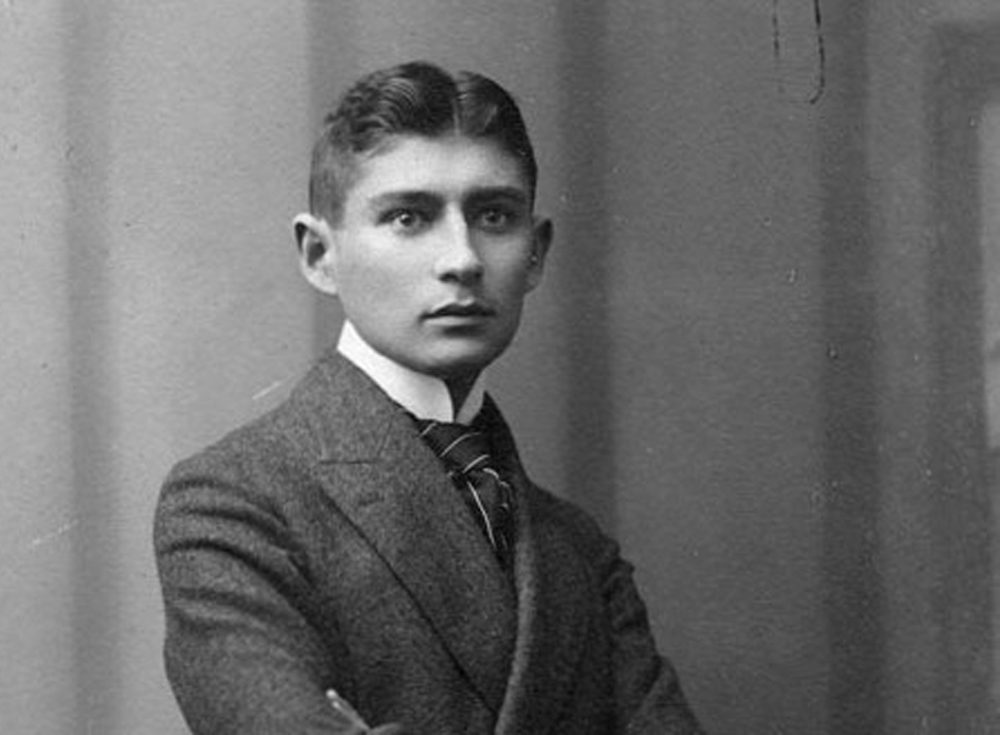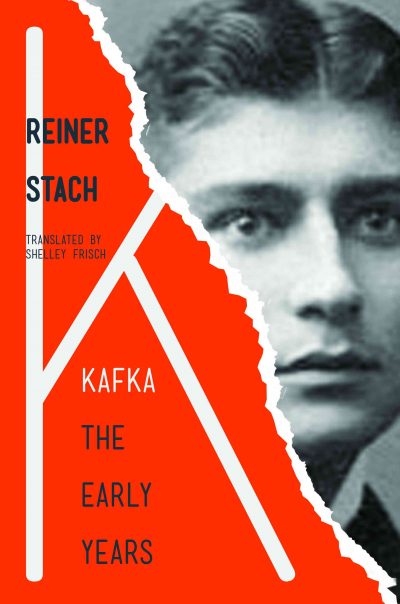Advertisement
'Kafka: The Early Years' Unlocks The Mind That Dragged Literature Into The Modern Era

The best thing a biographer of Franz Kafka can do is bring the famed author back to earth. Not as regards his reputation, which is justifiably lofty. But to humanize Kafka and save him from our collective idea of him as some otherworldly creature who spent a mere 40 years on this earth, suffering much and publishing little.
Reiner Stach accomplishes just this with the third and final volume of his magnificent biography, “Kafka: The Early Years” (published by Princeton). His Kafka is, not surprisingly, a complex man, tormented by all the well-documented demons, but also someone who liked to have fun and drink beer, a fan of both movie houses and brothels.
The trilogy has been 20 years in the making. This first volume, which covers the years 1883 through 1924, was written and published last, as Stach waited for the estate of Kafka’s friend Max Brod to be settled. This made available family letters, memoirs of Kafka’s schoolmates and sections of Brod’s diaries. Thus armed, Stach examines the familial, societal, political and cultural circumstances that shaped the young writer.

Stach seeks in this new volume to allow the reader to experience “what it was like to be Franz Kafka.” He succeeds thanks to the overwhelming amount of details he presents and his insightful interpretations of the impact all this had on Kafka.
“The Early Years” takes us from Kafka’s birth in July 1883 in the Old Town of Prague, through his preschool years, primary and secondary education, and ultimately to his job at an insurance company. If there is less inherent action and drama during these years — volumes two and three give us Kafka’s incredibly complicated love life, the writing of his greatest stories and novels and the slow spread of the tuberculosis that killed him — Stach uses the pages of this first volume to present the young Kafka in his milieu.
His portrait includes the effects of growing up in Prague, a binational city, where most of the locals spoke either German or Czech. Being shop owners, the members of the Kafka family, out of necessity, were fluent in both. A city of convoluted politics, where nationalism and anti-Semitism were prevalent, Prague in the years before World War I was a place where it was confusing if not downright unsettling to grow up, especially for a boy inherently sensitive. Add to this the influence of Hermann Kafka on his impressionable son’s psyche, and the adult Franz begins to come into focus.
Kafka felt like he could never measure up. A "model student," he was convinced he was "the most incapable, or at least the most ignorant of all." But by the age of about 12, he formed a desire to become a writer, fueled no doubt by his reading late into the night, and the years he spent as a putative only child, after the deaths of his younger brothers at 6 and 15 months respectively, the later arrival of his sisters, and with two parents working morning to night at the shop.
As he does in the other volumes of the trilogy, Stach makes much of Kafka’s famous "Letter to His Father," written in November 1919, where the young writer accuses his father of abusive behavior. The biographer adds to this a portrait of Hermann Kafka at home and at work: “aggressive and insulting” at the shop, and not much different otherwise, brooking little opposition, as he “shouted out in a violent fit of temper.” The unsparing businessman’s defining features were “mistrust, combativeness and crude utilitarianism.” Add to this young Franz’s fear of being abandoned by his mother, and it’s easy to see how Kafka came to feel that his early life was ruled by "a conspiracy of adults."

His father’s behavior and his regular firing of shop employees, coupled with the deaths of his baby brothers, Stach claims, scarred young Franz, giving him a “deep mistrust regarding the consistency of human relationships” and making him all too aware that people could simply disappear. Kafka grew up wary and defensive, afraid he could never match up. In his writing this would play out in two of his major themes: “power and subjugation.” Surviving and assimilating became Kafka’s reflexive actions, hence when the teenage Kafka joins a dance class, Stach tells us how he was sad to be excluded but joyful at being spared his turn in the proverbial spotlight. It got to the point where Kafka was unable to differentiate between a "vague pressure exerted by power hierarchies and actual clear and present dangers."
The work Kafka did at the Worker's Accident Insurance Institute fell into the same pattern. He was unsure of his talents, but by all accounts he was successful, making the most of his writing skills by turning out reports that brought him praise and promotions.
All the while, Kafka’s social life struggled along. With Brod bolstering his ego, he cultivated a group of like-minded friends also interested in writing. He visited spas with his family and alone, and became a great believer in a back-to-nature movement known in German as Lebensreform. Stach credits this movement for having an outsized effect on the shaping of Kafka — the man and writer. It included everything from vegetarianism to progressive education, to simple furnishings and clothing. On the page, the movement was manifest in Kafka’s teenage writing by the use of antiquated language.
After 461 pages (not counting notes), we can agree with Stach that there were no precedents or direct lines of influence leading to Kafka's style and unique perspective on the world. He ably demonstrates the external factors that so impacted his interiority, shown us all the elements that shaped the mind and abilities of the burgeoning genius. Stach’s writing is intelligent and persuasive, and translator Shelley Frisch, as she did in the other volumes, beautifully renders his German into English.
“Kafka: The Early Years” completes what is easily the definitive biography of this writer who was as haunted as his work is haunting. It’s a must for anyone who endeavors to understand the mind behind such novels as “The Trial,” a novella like “Metamorphosis” and short stories like “In the Penal Colony.” Stach strips away the myths and tells the story of how Kafka helped drag literature into the modern era.
